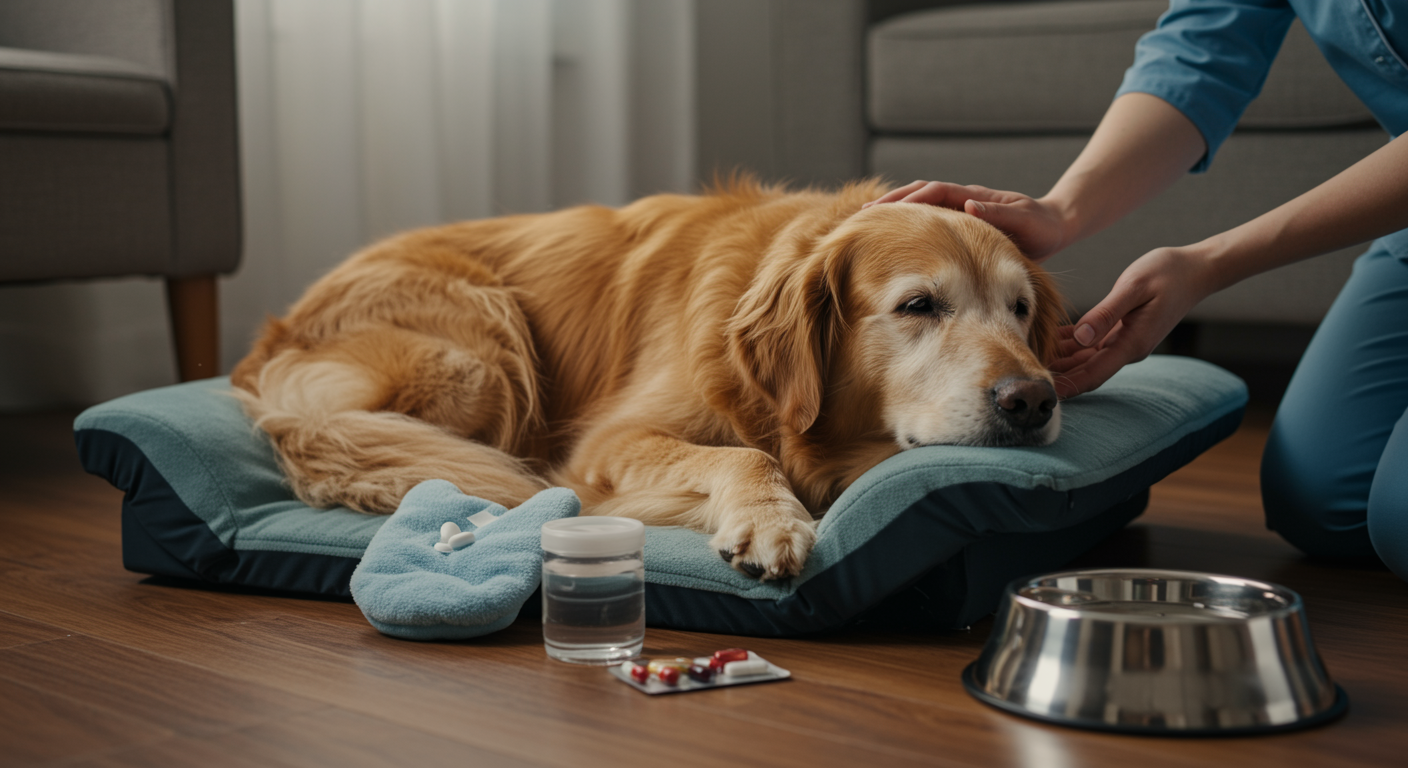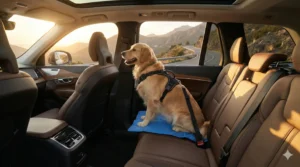Post-surgical care for senior Golden Retrievers requires specialized attention, patience, and understanding of the unique challenges that aging dogs face during recovery. Senior dogs often experience slower healing, increased sensitivity to medications, and greater difficulty adapting to activity restrictions, making comprehensive post-operative care essential for successful outcomes.
Understanding the specific needs of recovering senior Golden Retrievers helps families provide optimal support during this vulnerable period while promoting healing and preventing complications. The recovery process may take longer than expected, requiring extended commitment to careful monitoring and modified care routines.
Successful post-surgical care for senior dogs encompasses pain management, wound care, activity modification, nutritional support, and emotional comfort while adapting to the individual dog’s healing pace and specific surgical requirements. This comprehensive approach helps ensure the best possible recovery outcomes while maintaining quality of life throughout the healing process.
Understanding Senior Post-Surgical Challenges
Age-Related Healing Factors
Slower Recovery Processes
Senior Golden Retrievers typically experience slower tissue healing due to decreased cellular regeneration, reduced circulation, and age-related changes in immune function that affect the body’s ability to repair surgical sites effectively.
Protein synthesis and collagen production, essential for wound healing, naturally decrease with age, potentially extending recovery timelines and requiring patience from caregivers who may expect faster healing based on experiences with younger dogs.
Understanding these physiological limitations helps set realistic expectations for recovery timelines while ensuring that slower healing is supported rather than rushed, preventing complications that could arise from premature return to normal activities.
Medication Sensitivity and Processing
Senior dogs often process medications differently than younger dogs due to changes in liver and kidney function, potentially requiring dosage adjustments or extended monitoring for side effects during post-surgical medication protocols.
Anesthesia recovery may take longer in senior dogs, with some experiencing extended grogginess, disorientation, or appetite suppression that requires additional support and monitoring during the immediate post-operative period.
Multiple medications commonly prescribed after surgery may interact differently in senior dogs, requiring careful coordination and monitoring to ensure therapeutic benefits while minimizing adverse effects.
Physical Adaptation Challenges
Mobility and Comfort Issues
Senior Golden Retrievers may struggle more with activity restrictions required during post-surgical recovery due to existing arthritis or joint issues that make remaining stationary or moving carefully more challenging.
Comfortable positioning becomes crucial for senior dogs who may develop pressure sores or additional discomfort from prolonged rest periods required during recovery from various surgical procedures.
Adapting to protective devices such as cones, bandages, or mobility aids may be more difficult for senior dogs who have established routines and preferences that are disrupted by post-surgical requirements.
Immediate Post-Surgical Care
First 24-48 Hours Management
Recovery Environment Preparation
Creating a quiet, comfortable recovery space away from household activity helps senior dogs rest without stress while allowing for easy monitoring and care access during the critical initial recovery period.
Temperature control becomes particularly important for senior dogs recovering from surgery, as anesthesia and reduced activity can affect thermoregulation, requiring warm, draft-free environments for comfort and healing.
Easy access to water and comfortable elimination areas accommodates potential mobility limitations while ensuring that basic needs can be met without causing stress or strain on healing surgical sites.
Monitoring and Assessment
Frequent monitoring of vital signs, surgical sites, and overall comfort levels helps identify potential complications early when intervention can be most effective in preventing serious problems.
Understanding normal post-surgical symptoms versus concerning signs helps families provide appropriate care while knowing when immediate veterinary attention is necessary for complications or unexpected developments.
Detailed record-keeping of medications, appetite, elimination, and behavior patterns provides valuable information for veterinary follow-up and helps track recovery progress over time.
Pain Management and Comfort
Medication Administration
Proper pain management is crucial for senior Golden Retrievers who may experience more discomfort and have different pain tolerance levels compared to younger dogs recovering from similar procedures.
Understanding medication schedules, proper dosing, and potential side effects helps ensure effective pain control while monitoring for adverse reactions that may be more common in senior dogs.
Alternative comfort measures such as supportive bedding, gentle positioning, and environmental modifications can supplement medication-based pain management for comprehensive comfort support.
Post-Surgical Care Management Guide
| Care Aspect | First Week | Second Week | Third Week+ | Monitoring Signs | When to Call Vet |
|---|---|---|---|---|---|
| Pain Management | Strict medication schedule | Gradual reduction if appropriate | Assess ongoing needs | Pain behaviors, appetite changes | Uncontrolled pain, medication reactions |
| Activity Level | Strict rest, leash walks only | Short, controlled activities | Gradual increase as approved | Energy levels, surgical site stress | Excessive activity, complications |
| Wound Care | Daily cleaning and inspection | Continue monitoring | Healing assessment | Redness, swelling, discharge | Signs of infection, dehiscence |
| Appetite | Monitor closely, encourage eating | Expect gradual improvement | Should return to normal | Food intake, weight changes | Persistent poor appetite, weight loss |
| Elimination | Assist as needed | Increasing independence | Normal patterns resuming | Regularity, comfort level | Straining, accidents, discomfort |
| Medication | Full compliance, monitor effects | Possible adjustments | Completion or continuation | Side effects, effectiveness | Adverse reactions, concerns |
Wound Care and Surgical Site Management
Daily Wound Assessment
Inspection Techniques
Daily visual inspection of surgical sites helps identify early signs of complications such as infection, inflammation, or healing problems that require prompt veterinary attention.
Understanding normal healing progression versus concerning changes helps families monitor appropriately while avoiding unnecessary anxiety about normal healing processes.
Gentle cleaning techniques using veterinarian-approved solutions help maintain surgical site cleanliness without causing trauma or interfering with healing processes.
Preventing Complications
Preventing licking, scratching, or other interference with surgical sites often requires creative solutions for senior dogs who may be less tolerant of traditional protective devices like Elizabethan collars.
Alternative protective methods such as soft fabric cones, protective clothing, or bitter apple sprays may be more comfortable for senior dogs while still preventing surgical site trauma.
Environmental modifications to prevent jumping, running, or other activities that could stress surgical sites require careful planning and consistent implementation throughout the recovery period.
Bandage and Dressing Management
Proper Maintenance
When bandages or dressings are required, proper maintenance becomes crucial for preventing moisture buildup, infection, or circulation problems that could complicate healing.
Understanding when bandages should be changed, how to keep them dry, and signs that indicate problems helps ensure appropriate care while preventing complications.
Senior dogs may require more frequent bandage checks due to potential circulation issues or skin sensitivity that could cause problems with prolonged bandage wear.
Activity Management and Exercise Restriction
Gradual Activity Progression
Rest Period Management
Enforcing necessary rest periods can be challenging for senior Golden Retrievers who may become anxious or depressed with sudden activity restrictions, requiring creative approaches to mental stimulation and comfort.
Providing comfortable resting areas with appropriate support helps prevent pressure sores and joint stiffness that could develop during extended rest periods required for healing.
Understanding that mental stimulation becomes more important during physical restriction helps maintain psychological well-being while supporting physical recovery.
Controlled Exercise Introduction
Gradual reintroduction of activity should follow veterinary guidelines while considering the individual senior dog’s baseline fitness level and any pre-existing conditions that might affect recovery.
Leash walking and controlled movement help maintain muscle tone and joint mobility without placing excessive stress on healing surgical sites or compromising recovery.
Monitoring for signs of fatigue, discomfort, or overexertion helps guide appropriate activity levels while ensuring that exercise supports rather than hinders recovery.
Environmental Modifications
Safety Adaptations
Removing obstacles, providing non-slip surfaces, and ensuring easy access to necessary areas helps prevent falls or injuries that could complicate surgical recovery.
Blocking access to stairs, furniture, or other areas that might tempt inappropriate activity helps enforce activity restrictions while maintaining the dog’s comfort and access to necessary areas.
Creating clear pathways and removing hazards helps senior dogs navigate safely during periods when vision, coordination, or judgment might be affected by medications or discomfort.
Nutritional Support During Recovery
Appetite Stimulation and Nutrition
Encouraging Food Intake
Post-surgical appetite suppression is common in senior dogs and may persist longer than in younger dogs, requiring creative approaches to encourage adequate nutritional intake for healing.
Warming food, offering favorite treats, or providing variety in food textures can help stimulate appetite while ensuring adequate nutrition for tissue repair and recovery.
Hand feeding or providing elevated food bowls may help senior dogs eat more comfortably while accommodating any mobility limitations or discomfort from surgical procedures.
Nutritional Requirements for Healing
Increased protein needs during healing may require dietary modifications or supplements to support tissue repair, though these should be implemented under veterinary guidance.
Adequate hydration becomes particularly important for senior dogs recovering from surgery, as dehydration can impair healing and increase the risk of complications.
Understanding the connection between nutrition and healing helps families prioritize food intake while working with veterinary professionals to optimize nutritional support.
Digestive Health Support
Medication-Related Digestive Issues
Pain medications and antibiotics commonly prescribed after surgery can cause digestive upset in senior dogs, requiring monitoring and potential dietary modifications to maintain comfort.
Probiotics or digestive aids may be beneficial for maintaining gut health during antibiotic therapy, though these should be used under veterinary guidance.
Understanding medication side effects helps families distinguish between normal post-surgical symptoms and medication-related problems requiring attention.
Emotional Support and Comfort
Managing Anxiety and Stress
Comfort and Reassurance
Senior Golden Retrievers may experience increased anxiety during recovery due to discomfort, activity restrictions, or changes in routine that disrupt their sense of security and normalcy.
Providing consistent companionship, gentle reassurance, and maintaining familiar routines where possible helps reduce stress while supporting emotional well-being during recovery.
Understanding that emotional support contributes to physical healing helps families prioritize comfort and reassurance as important components of comprehensive post-surgical care.
Mental Stimulation Alternatives
Providing appropriate mental stimulation through gentle training, puzzle toys, or quiet interactive activities helps prevent boredom and depression during activity restriction periods.
Adapting mental enrichment activities to accommodate post-surgical limitations ensures continued cognitive engagement while respecting physical recovery requirements.
Creating positive associations with rest and recovery through special attention, treats, and gentle activities helps make the recovery period more pleasant for senior dogs.
Family Support and Involvement
Coordinated Care Approaches
Involving family members in post-surgical care helps ensure consistent monitoring and support while preventing caregiver fatigue that could compromise care quality.
Teaching family members proper care techniques, medication administration, and warning signs helps ensure comprehensive care while building confidence in providing appropriate support.
Understanding that recovery is a family effort helps distribute responsibilities while ensuring that the senior dog receives consistent, high-quality care throughout the healing process.
Long-Term Recovery Planning
Follow-Up Care Coordination
Veterinary Monitoring
Regular veterinary follow-up appointments help monitor healing progress, adjust medications as needed, and identify any complications that require intervention for optimal recovery outcomes.
Understanding the importance of completing prescribed medication courses and following activity restrictions helps ensure that short-term compliance supports long-term recovery success.
Communicating concerns or observations to veterinary professionals helps ensure that any issues are addressed promptly while maintaining confidence in the recovery process.
Return to Normal Activities
Gradual Transition Planning
Planning the gradual return to normal activities helps ensure that senior dogs regain their pre-surgical function while avoiding setbacks that could result from premature or excessive activity increases.
Understanding that full recovery may take longer in senior dogs helps set appropriate expectations while maintaining patience and consistency in providing supportive care.
Celebrating recovery milestones helps maintain positive attitudes while acknowledging progress and building confidence in the healing process for both dogs and families.
Complication Prevention and Management
Early Warning Sign Recognition
Identifying Problems
Understanding early warning signs of complications such as infection, dehiscence, or other post-surgical problems helps ensure prompt intervention when treatment can be most effective.
Regular monitoring and documentation of healing progress provides valuable information for identifying subtle changes that might indicate developing complications requiring attention.
Building strong communication with veterinary professionals ensures that concerns can be addressed promptly while maintaining confidence in the care team and recovery process.
Emergency Preparedness
Crisis Response Planning
Understanding what constitutes a post-surgical emergency and having clear plans for accessing emergency care helps ensure appropriate responses to serious complications.
Maintaining contact information for emergency veterinary services and understanding after-hours care options provides security and peace of mind during the recovery period.
Preparing emergency care supplies and understanding basic first aid measures helps families respond appropriately to unexpected situations while awaiting professional care.
Quality of Life During Recovery
Maintaining Comfort and Dignity
Balancing Care and Independence
Providing necessary care while maintaining the dog’s sense of independence and dignity helps support psychological well-being during the recovery period.
Understanding that recovery is temporary helps maintain perspective while providing the intensive care that senior dogs may require during post-surgical healing.
Focusing on comfort and quality of life during recovery helps ensure that the healing process enhances rather than diminishes overall well-being and happiness.
Celebrating Recovery Progress
Positive Reinforcement
Acknowledging and celebrating recovery milestones helps maintain positive attitudes and motivation throughout what can be a challenging period for both dogs and families.
Understanding that each small improvement represents progress toward full recovery helps maintain patience and dedication to providing excellent care throughout the healing process.
Creating positive associations with recovery care helps senior dogs cooperate with necessary restrictions and treatments while maintaining trust and comfort with their caregivers.
Caring for senior Golden Retrievers after surgery requires patience, dedication, and understanding of the unique challenges that aging dogs face during recovery. Through comprehensive attention to physical comfort, emotional support, and careful monitoring, families can help ensure successful outcomes while maintaining quality of life throughout the healing process.
Success in post-surgical care comes from understanding that senior dogs may require modified approaches and extended timelines while providing the consistent, loving care that supports both physical healing and emotional well-being. With proper attention and dedication, most senior Golden Retrievers can achieve excellent recovery outcomes while maintaining their comfort and dignity throughout the process.
The investment in comprehensive post-surgical care pays dividends in successful recovery, maintained quality of life, and the continued health and happiness of beloved senior Golden Retrievers as they heal and return to enjoying their golden years with renewed comfort and vitality.



